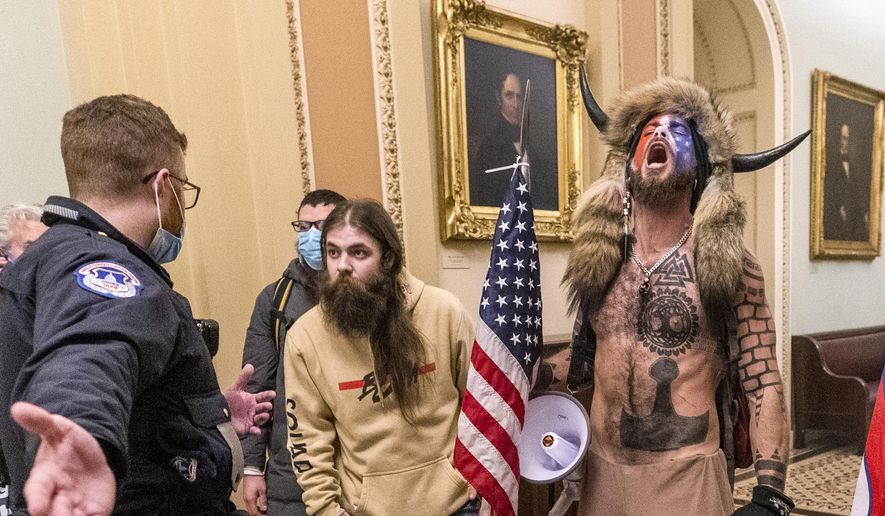Lawyers representing defendants charged in connection with the Jan. 6 riot at the U.S. Capitol say they’ve received an excess of violent threats for taking on the job.
The defense attorneys, most of whom are representing clients charged with misdemeanors, describe being harassed with hateful phone calls, some of which include verbal warnings of violence and death.
“I’ve received death threats,” said Albert Watkins, a St. Louis-based attorney representing four riot defendants, including ’QAnon Shaman’ Jacob Chansley. “I’ve had an anthrax scare with people in hazmat suits having to come out. There’s at least one federal prosecution going on right now where I’m designated as the victim as a result of one of the threats.”
Mr. Watkins, who has been outspoken about his defense work, said he wants to continue raising awareness about the issues that he thinks need to be worked out by the Justice Department in such cases.
For example, Mr. Watkins said the prosecution of the rioters was rushed before the conclusion of a full investigation into Jan. 6, and that the government didn’t consider all the evidence.
Despite public harassment, Mr. Watkins said he wants to continue speaking out on the issues he is concerned about.
“None of that bothered me,” Mr. Watkins said of the threats. “Gone are the days where legal counsel do good for a client by saying ’no comment.’ I’m not a stranger to high-profile cases.”
Mr. Watkins also represents Mark and Patricia McCloskey, the gun-toting St. Louis couple who pointed their weapons at protesters last year.
Nabeel Kibria is a D.C.-based attorney who represented a couple who pleaded guilty and whose cases have since closed, and remains on five other cases related to the Jan. 6 riot.
Mr. Kibria said he’s received incessant calls, including death threats, though he’s also received calls supportive of his efforts.
“The most extreme incidents were one or two calls saying we’ll find you and hunt you down and kill you, or you’re a piece of garbage and should be locked up with the keys thrown away,” Mr. Kibria said.
Mr. Kibria said the calls spiked in the 48 hours after two of his clients entered their plea and then in the two days after they were sentenced.
Several other defense attorneys contacted for this story did not want to comment, though some privately said they’ve also been the subject of threats.
The Jan. 6 riot has remained a high-profile incident at the center of concern in Congress, law enforcement, and the Justice Department.
A rally in support of defendants’ right to a fair trial will be held on Saturday at the Capitol, bringing increased scrutiny on the legal process of rioters.
Asked about the incidents described by attorneys working in the District, the DC Bar Association condemned the behavior.
“The D.C. Bar absolutely condemns threats and violence against all individuals, including attorneys,” a spokesperson said.
Threats against those in the legal profession have risen in recent years, according to data compiled by the U.S. Marshall’s office.
Between the fiscal years of 1980 to 1993, there were roughly 238 “threats and inappropriate communications” made against protected individuals.
In 2017, there were 2,847 threats made, while 4,542 were reported in 2018.
In 2020, there were 4,261 reported incidents.
Rosa Brooks, a law professor at Georgetown University, said it’s common for cases with even the slightest hint of political toxicity to be the center of negative attention, particularly in a polarized climate.
“I can say that in our overheated political climate, anyone who becomes publicly visible on virtually anything controversial tends to get death threats and harassment,” Ms. Brooks said.
Mr. Kibria said he doesn’t bring politics into his job as a defense attorney, but turned down clients who had assaulted or injured police officers, or engaged in other violent conduct.
“I do believe that on January 6, certain people, not all people, but certain people were there to do damage and do harm to our democracy and to do harm to others. And for those people, I did not take their case, but not everybody was a part of that,” Mr. Kibria said.
Stephen Kelson, a Utah-based attorney who has conducted studies about growing threats against attorneys in 30 states, said those who work in criminal or family law are more susceptible to being the victim of violent threats and attacks.
Mr. Kelson said the issue is not something that’s been discussed much, partly due to a stigma about publicizing such incidents.
“[Attorneys] consider it to be part of the job, a one-off kind of situation, and that if they discuss it more publicly, they may appear to make the impression that they’re weak or they can’t handle their job,” Mr. Kelson said.
Mr. Watkins said he views staying on his cases no matter the cost as a “professional duty,” and one that includes continuing to be an advocate for his clients, including Mr. Chansley, who is largely considered to be the face of Jan. 6.
“The sweet surrender of death does not scare me,” Mr. Watkins said. “What does scare me is the willingness of others to be scared, and to turn away from making sure that justice is done.”
• Mica Soellner can be reached at msoellner@washingtontimes.com.




Please read our comment policy before commenting.